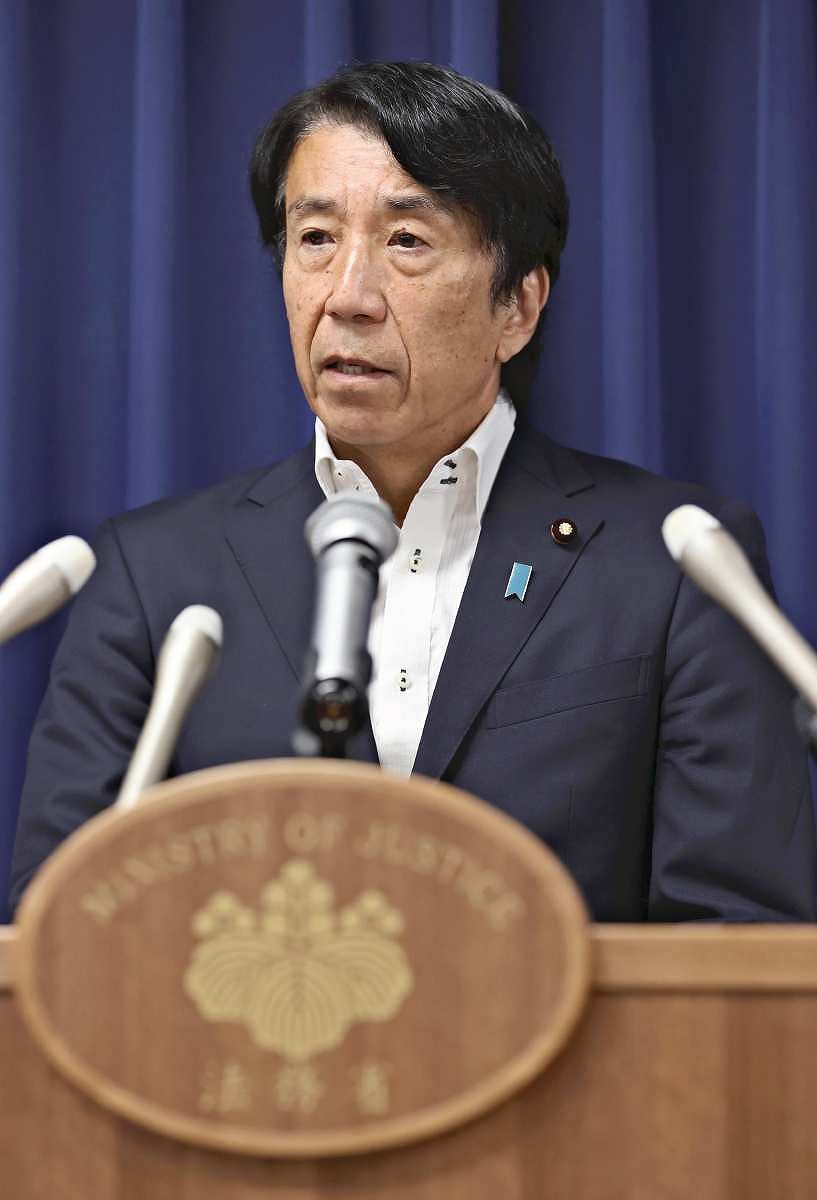140 Children of Foreign Nationals Facing Deportation to be Granted Special Permission to Stay in Japan

Justice Minister Ken Saito speaks at a press conference in Tokyo on Friday.
17:59 JST, August 4, 2023
About 140 children of foreign nationals who do not have resident status despite being born and raised in Japan will be granted special permission to stay in the country, Justice Minister Ken Saito announced Friday.
The government has decided to implement the special measure based on humanitarian grounds.
Special permission for residency will be granted at the discretion of the justice minister provided certain requirements are fulfilled. The number of people who will receive the special status is expected to be in the hundreds, including parents.
“The government hopes to issue special permission for residency to children who were born in Japan, received education here and wish to continue living in the country, out of consideration for their ties to Japanese society,” Saito said at a press conference on Friday.
“The special measure will enable us to protect children as much as possible, while appropriately managing immigration and residency affairs,” Saito said.
Foreigners who make three or more applications for refugee status can be deported under the revised Immigration Control and Refugee Recognition Law enacted in June, raising concerns that children who have only ever lived in Japan could face deportation if their parents are ordered to leave the country.
According to the Immigration Services Agency, 4,233 people were facing deportation but were refusing to leave Japan as of the end of 2022, including 201 under the age of 18 who were born and raised in the country. Of them, about 140 minors, or about 70%, are expected to receive special permission for residency.
In many cases, the foreign parents of such minors overstayed their visas after entering Japan with student or temporary visitor statuses, then they repeatedly applied for refugee status, and subsequently got married and had children.
The Justice Ministry will take into account whether the children were born in Japan, studied at elementary or junior high schools, and their desire to live in the country when considering eligibility for the special status.
However, children whose parents have entered Japan illegally, committed crimes such as drug offenses and prostitution, served more than one year in prison, or have committed multiple offenses will not be considered, in principle.
The majority of the 201 minors are currently on provisional release from detention. Although they can attend public schools, they cannot receive national health insurance and are subject to many restrictions, such as not being able to travel outside the prefecture where they live without permission.
Top Articles in Politics
-

Japan PM Takaichi’s Cabinet Resigns en Masse
-

Sanae Takaichi Elected Prime Minister of Japan; Keeps All Cabinet Appointees from Previous Term
-

Japan’s Govt to Submit Road Map for Growth Strategy in March, PM Takaichi to Announce in Upcoming Policy Speech
-

LDP Wins Historic Landslide Victory
-

LDP Wins Landslide Victory, Secures Single-party Majority; Ruling Coalition with JIP Poised to Secure Over 300 seats (UPDATE 1)
JN ACCESS RANKING
-

Producer Behind Pop Group XG Arrested for Cocaine Possession
-

Japan PM Takaichi’s Cabinet Resigns en Masse
-

Man Infected with Measles Reportedly Dined at Restaurant in Tokyo Station
-

Israeli Ambassador to Japan Speaks about Japan’s Role in the Reconstruction of Gaza
-

Videos Plagiarized, Reposted with False Subtitles Claiming ‘Ryukyu Belongs to China’; Anti-China False Information Also Posted in Japan

























